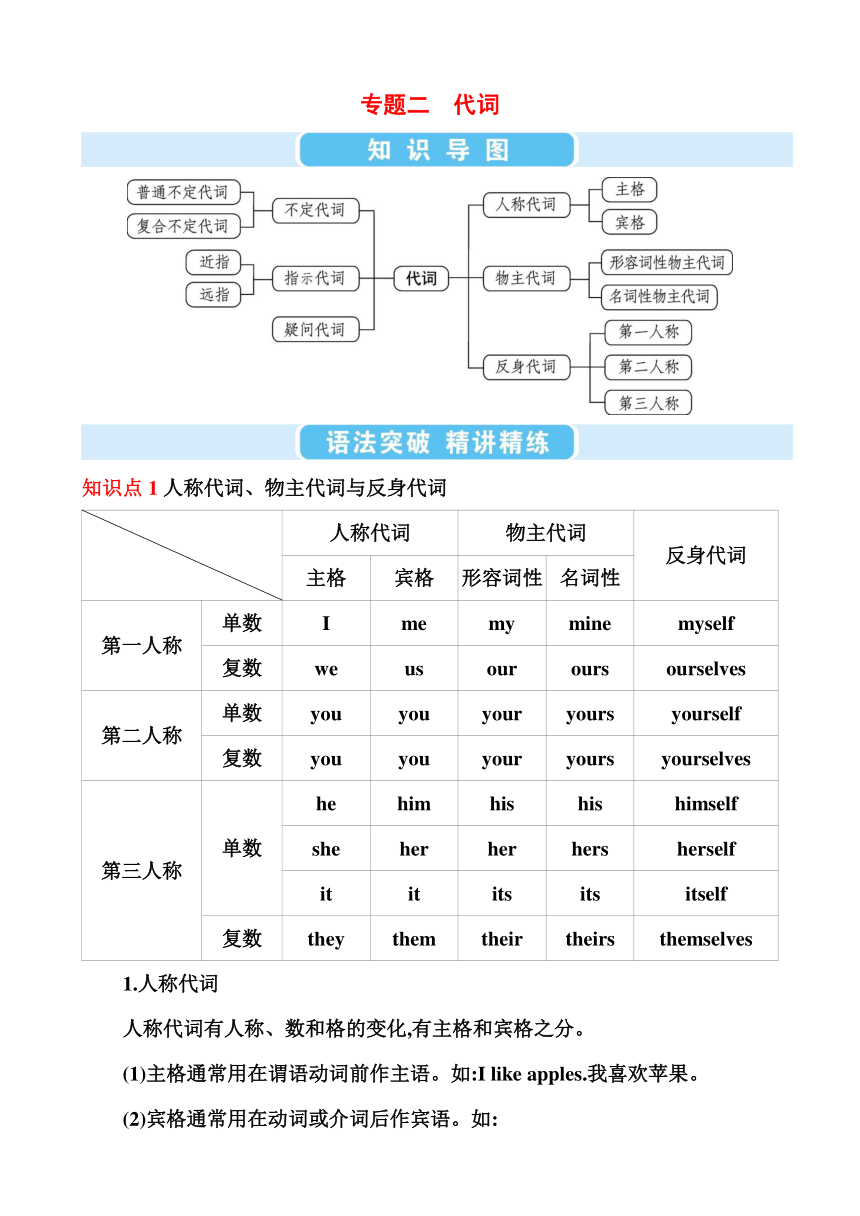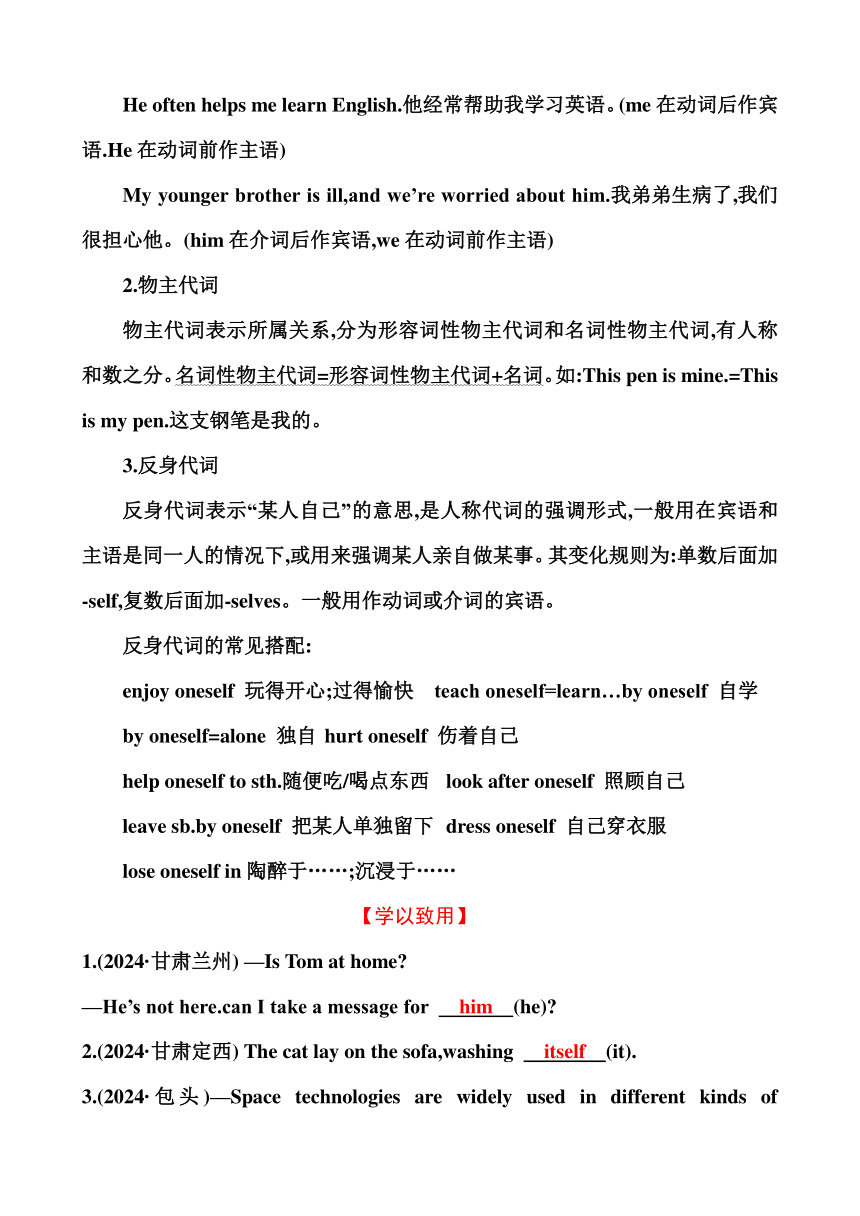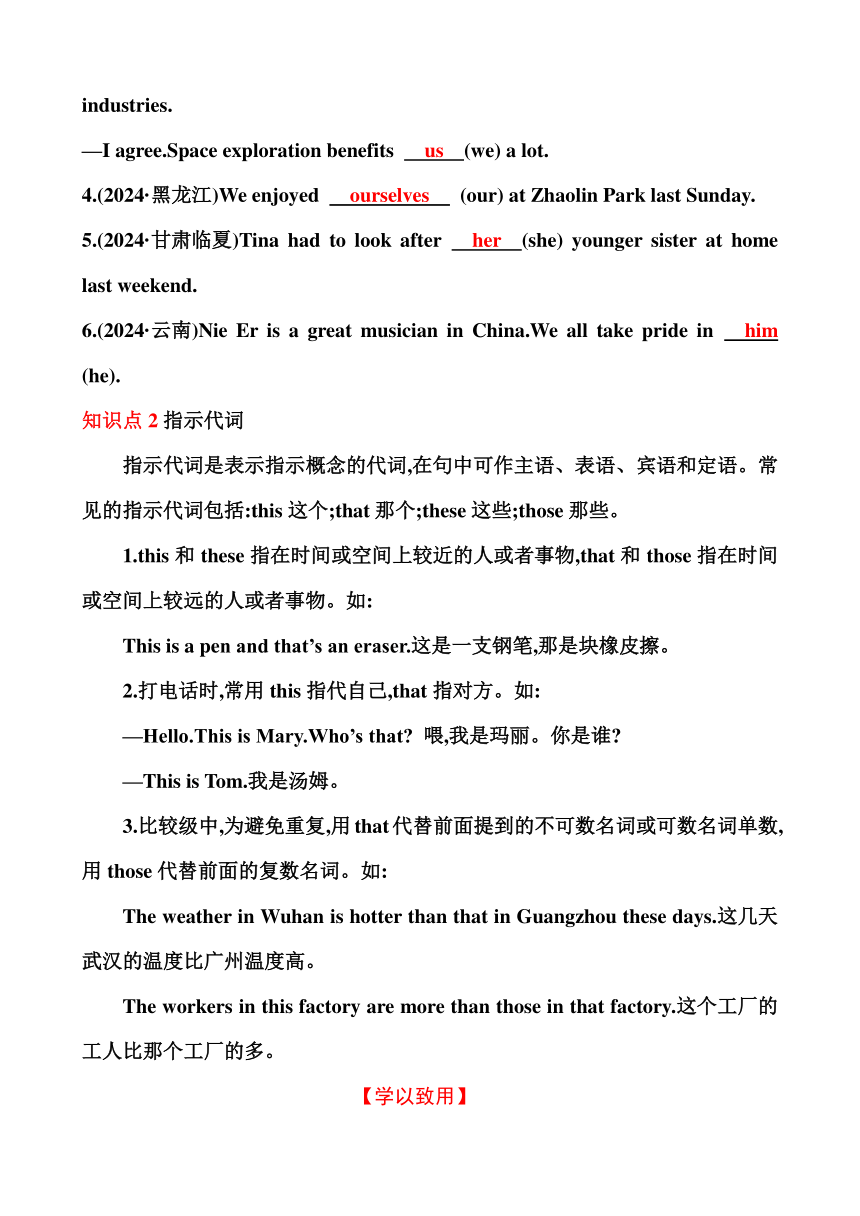02 专题二 代词 学案 2025年中考英语语法精讲(人教版)
文档属性
| 名称 | 02 专题二 代词 学案 2025年中考英语语法精讲(人教版) |

|
|
| 格式 | docx | ||
| 文件大小 | 117.9KB | ||
| 资源类型 | 教案 | ||
| 版本资源 | 人教新目标(Go for it)版 | ||
| 科目 | 英语 | ||
| 更新时间 | 2024-12-17 00:00:00 | ||
图片预览




文档简介
专题二 代词
知识点1人称代词、物主代词与反身代词
人称代词 物主代词 反身代词
主格 宾格 形容词性 名词性
第一人称 单数 I me my mine myself
复数 we us our ours ourselves
第二人称 单数 you you your yours yourself
复数 you you your yours yourselves
第三人称 单数 he him his his himself
she her her hers herself
it it its its itself
复数 they them their theirs themselves
1.人称代词
人称代词有人称、数和格的变化,有主格和宾格之分。
(1)主格通常用在谓语动词前作主语。如:I like apples.我喜欢苹果。
(2)宾格通常用在动词或介词后作宾语。如:
He often helps me learn English.他经常帮助我学习英语。(me在动词后作宾语.He在动词前作主语)
My younger brother is ill,and we’re worried about him.我弟弟生病了,我们很担心他。(him在介词后作宾语,we在动词前作主语)
2.物主代词
物主代词表示所属关系,分为形容词性物主代词和名词性物主代词,有人称和数之分。名词性物主代词=形容词性物主代词+名词。如:This pen is mine.=This is my pen.这支钢笔是我的。
3.反身代词
反身代词表示“某人自己”的意思,是人称代词的强调形式,一般用在宾语和主语是同一人的情况下,或用来强调某人亲自做某事。其变化规则为:单数后面加-self,复数后面加-selves。一般用作动词或介词的宾语。
反身代词的常见搭配:
enjoy oneself 玩得开心;过得愉快 teach oneself=learn…by oneself 自学
by oneself=alone 独自 hurt oneself 伤着自己
help oneself to sth.随便吃/喝点东西 look after oneself 照顾自己
leave sb.by oneself 把某人单独留下 dress oneself 自己穿衣服
lose oneself in陶醉于……;沉浸于……
【学以致用】
1.(2024·甘肃兰州) —Is Tom at home
—He’s not here.can I take a message for him (he)
2.(2024·甘肃定西) The cat lay on the sofa,washing itself (it).
3.(2024·包头)—Space technologies are widely used in different kinds of industries.
—I agree.Space exploration benefits us (we) a lot.
4.(2024·黑龙江)We enjoyed ourselves (our) at Zhaolin Park last Sunday.
5.(2024·甘肃临夏)Tina had to look after her (she) younger sister at home last weekend.
6.(2024·云南)Nie Er is a great musician in China.We all take pride in him (he).
知识点2指示代词
指示代词是表示指示概念的代词,在句中可作主语、表语、宾语和定语。常见的指示代词包括:this这个;that那个;these这些;those那些。
1.this和these指在时间或空间上较近的人或者事物,that和those指在时间或空间上较远的人或者事物。如:
This is a pen and that’s an eraser.这是一支钢笔,那是块橡皮擦。
2.打电话时,常用this指代自己,that指对方。如:
—Hello.This is Mary.Who’s that 喂,我是玛丽。你是谁
—This is Tom.我是汤姆。
3.比较级中,为避免重复,用that代替前面提到的不可数名词或可数名词单数,用those代替前面的复数名词。如:
The weather in Wuhan is hotter than that in Guangzhou these days.这几天武汉的温度比广州温度高。
The workers in this factory are more than those in that factory.这个工厂的工人比那个工厂的多。
【学以致用】
1.—How cold here!
—Yes.The weather in Guangyuan is much colder than that in your hometown.
2.—Who’s that speaking
— This is Lin Tao.
3.The apples in Beijing are bigger than those in Shanghai,I think.
知识点3不定代词
不明确指代某个(些)人、某个(些)事物而起名词或形容词作用的代词叫作不定代词。不定代词没有主格和宾格之分。常见的不定代词如下:
类别 肯定意义的不定代词 both,all,each,either,many,much,a few,a little,one,other(s),the other(s),someone,somebody,something,anyone,anybody,anything等
否定意义的不定代词 neither,none,nobody,nothing,few,little
功能 在句中可作主语、宾语、表语等
1.普通不定代词
(1)both,all,either,any,neither,none
both 两者都 all 三者或三者以上都
either 两者之一 any 三者或三者以上之一
neither 两者都不 none 三者或三者以上都不
Both of my parents are doctors.我的父母都是医生。
All of the students are interested in it.所有的学生都对此很感兴趣。
He has two sons.Neither of them is rich.他有两个儿子,都不富有。
He has three sons.None of them is rich.他有三个儿子,都不富有。
(2)some和any
单词 用法 例句
some 常用于肯定句中 I have some interesting storybooks at home. 我家里有一些有趣的故事书。
any 常用于否定句、疑问句和条件句中,但在表示请求、邀请、征求意见、反问的句子中,通常用 some而不用any Do you like any of these movies 你喜欢这些电影吗 I need a dictionary.Any kind will do. 我需要一本词典,什么样的都行。
(3)little,a little,few,a few
few,a few修饰可数名词复数形式,little,a little修饰不可数名词。a few,a little含有肯定意义,意为“一些”,而little,few含有否定意义,意为“几乎没有”,在构成反意疑问句时,附加部分要用肯定形式。如:
—Is there any water in the bottle 瓶子里有水吗
—Yes,there’s a little in it.是的,瓶子里有一点。
Few people knew about the accident,did they 几乎没人知道这场事故,是吗
(4)each,every
each对两个或两个以上的人或物而言,侧重个体,可单独作主语、宾语,也可以作定语;every是对三个或三个以上的人或物而言,侧重整体,不能指两个,且不能单独使用,只能作定语。如:
Each of us likes the music that we can dance to.我们每个人都喜欢可以跟着一起跳的音乐。
Every student should study all subjects carefully.每一位学生都应该认真学习所有的学科。
(5)other,others,the other,the others,another,one,ones
单词/短语 用法 例句
other 后接名词复数形式;any other+可数名词单数,意为“其他的任何一个……” He is taller than any other student in our class. 他比我们班任何一名学生都要高。
others 泛指其他人或物,others后不接名词;some…others…意为“一些……另一些……” Some students like chess,some like painting,while others like reading.一些学生喜欢下棋,一些喜欢画画,还有一些喜欢阅读。
the other 表示“两者中的另一个”,一般不接名词。one…the other…意为“一个……另一个……” I have two hobbies.One is playing soccer,and the other is singing songs. 我有两个爱好,一个是踢足球,另一个是唱歌。
the others 后不接名词,常与具体数目连用 Only two students in my class failed in the examination,the others all passed it. 我们班上除了两个学生考试没通过外,其他的都通过了。
another 指三个或三个以上的“另一、再一”,一般后接名词;“another+基数词+名词”=“基数词+more+名词”(基数词如one,two,three,four等) I don’t like this blouse.Please give me another one. 我不喜欢这件衬衫,请给我拿另外一件。 He makes a good recovery and lives another 16 years. =He makes a good recovery and lives 16 more years. 他恢复得很好,并且多活了16年。
one 表示“一个”,可以代替前面提到过的人或物的单数形式 —I’d like to see that scarf. 我想看看那条围巾。 —Which one The red one or the yellow one —哪一条 红色的还是黄色的
ones 可以代替前面的复数名词 I don’t like the blue trousers.Do you have black ones 我不喜欢蓝色裤子.你们有黑色的吗
2.复合不定代词
somebody anybody everybody nobody
someone anyone everyone no one
something anything everything nothing
(1)由some-和any-构成的复合不定代词,其区别与some和any的区别基本相同;
(2)nobody,nothing与no one表示否定意义;
(3)复合不定代词常作主语、宾语或表语,不能作定语。作主语时,谓语动词用单数。如:
Everything goes well.一切顺利。
(4)当形容词或else修饰复合不定代词时,形容词或else必须后置。如:
There’s nothing interesting in today’s newspaper.今天的报纸上没有有趣的事情。
Can you talk to anyone else 你能和别人谈谈吗
【学以致用】
1.—What did your sister buy for your mother on Mother’s Day
— Nothing .She made a card for her.
2.—When shall we go swimming,this Friday or Saturday
— Either is OK.I’ll be free this week.
3.Li Hua is taller than any other boy in his class.
4.—Excuse me.Is there any ticket for this Friday
—Sorry,but we’ve got none left.
5.(2024·浙江模拟改编)—Which festival do you like better,Christmas Day or Thankgiving Day
—Neither .I like Chinese traditional festivals.
知识点4疑问代词
疑问代词通常位于句子开头,用来引导特殊疑问句,并在句中充当某一句子成分,包括who,whom,whose,what,which等。
【学以致用】
1.(2023·浙江杭州模拟)—Whose book is this
—It must be Jim’s.You can see his name on the cover.
2.(2023·四川眉山)—Look.Here is a Harry Potter.I’m wondering whose book it is.
—It must be Mary’s.J.K.Rowling is her favorite writer.
知识点1人称代词、物主代词与反身代词
人称代词 物主代词 反身代词
主格 宾格 形容词性 名词性
第一人称 单数 I me my mine myself
复数 we us our ours ourselves
第二人称 单数 you you your yours yourself
复数 you you your yours yourselves
第三人称 单数 he him his his himself
she her her hers herself
it it its its itself
复数 they them their theirs themselves
1.人称代词
人称代词有人称、数和格的变化,有主格和宾格之分。
(1)主格通常用在谓语动词前作主语。如:I like apples.我喜欢苹果。
(2)宾格通常用在动词或介词后作宾语。如:
He often helps me learn English.他经常帮助我学习英语。(me在动词后作宾语.He在动词前作主语)
My younger brother is ill,and we’re worried about him.我弟弟生病了,我们很担心他。(him在介词后作宾语,we在动词前作主语)
2.物主代词
物主代词表示所属关系,分为形容词性物主代词和名词性物主代词,有人称和数之分。名词性物主代词=形容词性物主代词+名词。如:This pen is mine.=This is my pen.这支钢笔是我的。
3.反身代词
反身代词表示“某人自己”的意思,是人称代词的强调形式,一般用在宾语和主语是同一人的情况下,或用来强调某人亲自做某事。其变化规则为:单数后面加-self,复数后面加-selves。一般用作动词或介词的宾语。
反身代词的常见搭配:
enjoy oneself 玩得开心;过得愉快 teach oneself=learn…by oneself 自学
by oneself=alone 独自 hurt oneself 伤着自己
help oneself to sth.随便吃/喝点东西 look after oneself 照顾自己
leave sb.by oneself 把某人单独留下 dress oneself 自己穿衣服
lose oneself in陶醉于……;沉浸于……
【学以致用】
1.(2024·甘肃兰州) —Is Tom at home
—He’s not here.can I take a message for him (he)
2.(2024·甘肃定西) The cat lay on the sofa,washing itself (it).
3.(2024·包头)—Space technologies are widely used in different kinds of industries.
—I agree.Space exploration benefits us (we) a lot.
4.(2024·黑龙江)We enjoyed ourselves (our) at Zhaolin Park last Sunday.
5.(2024·甘肃临夏)Tina had to look after her (she) younger sister at home last weekend.
6.(2024·云南)Nie Er is a great musician in China.We all take pride in him (he).
知识点2指示代词
指示代词是表示指示概念的代词,在句中可作主语、表语、宾语和定语。常见的指示代词包括:this这个;that那个;these这些;those那些。
1.this和these指在时间或空间上较近的人或者事物,that和those指在时间或空间上较远的人或者事物。如:
This is a pen and that’s an eraser.这是一支钢笔,那是块橡皮擦。
2.打电话时,常用this指代自己,that指对方。如:
—Hello.This is Mary.Who’s that 喂,我是玛丽。你是谁
—This is Tom.我是汤姆。
3.比较级中,为避免重复,用that代替前面提到的不可数名词或可数名词单数,用those代替前面的复数名词。如:
The weather in Wuhan is hotter than that in Guangzhou these days.这几天武汉的温度比广州温度高。
The workers in this factory are more than those in that factory.这个工厂的工人比那个工厂的多。
【学以致用】
1.—How cold here!
—Yes.The weather in Guangyuan is much colder than that in your hometown.
2.—Who’s that speaking
— This is Lin Tao.
3.The apples in Beijing are bigger than those in Shanghai,I think.
知识点3不定代词
不明确指代某个(些)人、某个(些)事物而起名词或形容词作用的代词叫作不定代词。不定代词没有主格和宾格之分。常见的不定代词如下:
类别 肯定意义的不定代词 both,all,each,either,many,much,a few,a little,one,other(s),the other(s),someone,somebody,something,anyone,anybody,anything等
否定意义的不定代词 neither,none,nobody,nothing,few,little
功能 在句中可作主语、宾语、表语等
1.普通不定代词
(1)both,all,either,any,neither,none
both 两者都 all 三者或三者以上都
either 两者之一 any 三者或三者以上之一
neither 两者都不 none 三者或三者以上都不
Both of my parents are doctors.我的父母都是医生。
All of the students are interested in it.所有的学生都对此很感兴趣。
He has two sons.Neither of them is rich.他有两个儿子,都不富有。
He has three sons.None of them is rich.他有三个儿子,都不富有。
(2)some和any
单词 用法 例句
some 常用于肯定句中 I have some interesting storybooks at home. 我家里有一些有趣的故事书。
any 常用于否定句、疑问句和条件句中,但在表示请求、邀请、征求意见、反问的句子中,通常用 some而不用any Do you like any of these movies 你喜欢这些电影吗 I need a dictionary.Any kind will do. 我需要一本词典,什么样的都行。
(3)little,a little,few,a few
few,a few修饰可数名词复数形式,little,a little修饰不可数名词。a few,a little含有肯定意义,意为“一些”,而little,few含有否定意义,意为“几乎没有”,在构成反意疑问句时,附加部分要用肯定形式。如:
—Is there any water in the bottle 瓶子里有水吗
—Yes,there’s a little in it.是的,瓶子里有一点。
Few people knew about the accident,did they 几乎没人知道这场事故,是吗
(4)each,every
each对两个或两个以上的人或物而言,侧重个体,可单独作主语、宾语,也可以作定语;every是对三个或三个以上的人或物而言,侧重整体,不能指两个,且不能单独使用,只能作定语。如:
Each of us likes the music that we can dance to.我们每个人都喜欢可以跟着一起跳的音乐。
Every student should study all subjects carefully.每一位学生都应该认真学习所有的学科。
(5)other,others,the other,the others,another,one,ones
单词/短语 用法 例句
other 后接名词复数形式;any other+可数名词单数,意为“其他的任何一个……” He is taller than any other student in our class. 他比我们班任何一名学生都要高。
others 泛指其他人或物,others后不接名词;some…others…意为“一些……另一些……” Some students like chess,some like painting,while others like reading.一些学生喜欢下棋,一些喜欢画画,还有一些喜欢阅读。
the other 表示“两者中的另一个”,一般不接名词。one…the other…意为“一个……另一个……” I have two hobbies.One is playing soccer,and the other is singing songs. 我有两个爱好,一个是踢足球,另一个是唱歌。
the others 后不接名词,常与具体数目连用 Only two students in my class failed in the examination,the others all passed it. 我们班上除了两个学生考试没通过外,其他的都通过了。
another 指三个或三个以上的“另一、再一”,一般后接名词;“another+基数词+名词”=“基数词+more+名词”(基数词如one,two,three,four等) I don’t like this blouse.Please give me another one. 我不喜欢这件衬衫,请给我拿另外一件。 He makes a good recovery and lives another 16 years. =He makes a good recovery and lives 16 more years. 他恢复得很好,并且多活了16年。
one 表示“一个”,可以代替前面提到过的人或物的单数形式 —I’d like to see that scarf. 我想看看那条围巾。 —Which one The red one or the yellow one —哪一条 红色的还是黄色的
ones 可以代替前面的复数名词 I don’t like the blue trousers.Do you have black ones 我不喜欢蓝色裤子.你们有黑色的吗
2.复合不定代词
somebody anybody everybody nobody
someone anyone everyone no one
something anything everything nothing
(1)由some-和any-构成的复合不定代词,其区别与some和any的区别基本相同;
(2)nobody,nothing与no one表示否定意义;
(3)复合不定代词常作主语、宾语或表语,不能作定语。作主语时,谓语动词用单数。如:
Everything goes well.一切顺利。
(4)当形容词或else修饰复合不定代词时,形容词或else必须后置。如:
There’s nothing interesting in today’s newspaper.今天的报纸上没有有趣的事情。
Can you talk to anyone else 你能和别人谈谈吗
【学以致用】
1.—What did your sister buy for your mother on Mother’s Day
— Nothing .She made a card for her.
2.—When shall we go swimming,this Friday or Saturday
— Either is OK.I’ll be free this week.
3.Li Hua is taller than any other boy in his class.
4.—Excuse me.Is there any ticket for this Friday
—Sorry,but we’ve got none left.
5.(2024·浙江模拟改编)—Which festival do you like better,Christmas Day or Thankgiving Day
—Neither .I like Chinese traditional festivals.
知识点4疑问代词
疑问代词通常位于句子开头,用来引导特殊疑问句,并在句中充当某一句子成分,包括who,whom,whose,what,which等。
【学以致用】
1.(2023·浙江杭州模拟)—Whose book is this
—It must be Jim’s.You can see his name on the cover.
2.(2023·四川眉山)—Look.Here is a Harry Potter.I’m wondering whose book it is.
—It must be Mary’s.J.K.Rowling is her favorite writer.
同课章节目录
- 词法
- 名词
- 动词和动词短语
- 动词语态
- 动词时态
- 助动词和情态动词
- 非谓语动词
- 冠词
- 代词
- 数词和量词
- 形容词副词及其比较等级
- 介词和介词短语
- 连词和感叹词
- 构词法
- 相似、相近词比较
- 句法
- 陈述句
- 一般疑问句和否定疑问句
- 特殊疑问句及选择疑问句
- 反意疑问句
- 存在句(There be句型)
- 宾语从句
- 定语从句
- 状语从句
- 主谓一致问题
- 简单句
- 并列句
- 复合句
- 主谓一致
- 主、表语从句
- 名词性从句
- 直接引语和间接引语
- 虚拟语气
- 感叹句
- 强调句
- 倒装句
- 祈使句
- 句子的成分
- 句子的分类
- 题型专区
- 单项选择部分
- 易错题
- 完形填空
- 阅读理解
- 词汇练习
- 听说训练
- 句型转换
- 补全对话
- 短文改错
- 翻译
- 书面表达
- 任务型阅读
- 语法填空
- 其他资料
